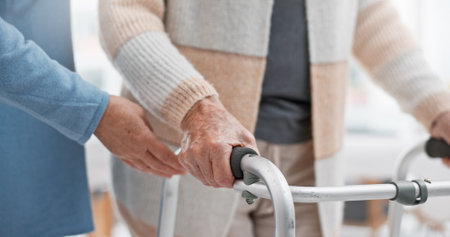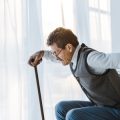Introduction to Fall Prevention in the NHS
Falls are a significant concern for older adults across England, Scotland, Wales, and Northern Ireland, with profound implications for health, independence, and quality of life. The prevention of falls is therefore a major priority within the National Health Service (NHS), which plays a central role in safeguarding the safety and well-being of older people. Each year, thousands of individuals over the age of 65 experience a fall, often leading to injuries that can be both physically and emotionally debilitating. Recognising these risks, the NHS has developed comprehensive policies and resources aimed at reducing falls, supporting recovery, and promoting continued independence among older adults. Through collaborative efforts with local authorities, healthcare professionals, carers, and communities, the NHS works to ensure that effective fall prevention strategies are accessible throughout the United Kingdom. By fostering awareness, encouraging proactive interventions, and providing tailored support, the NHS continues its commitment to helping older adults live safely and confidently in their own homes and communities.
2. Key NHS Policies Addressing Falls
In the United Kingdom, fall prevention among older adults is a significant focus within the NHS, with several comprehensive policies and frameworks in place to guide healthcare professionals and carers. These initiatives are designed not only to reduce the incidence of falls but also to enhance the quality of life for elderly individuals through holistic care approaches.
NICE Guidance on Falls in Older People
The National Institute for Health and Care Excellence (NICE) offers pivotal guidance that underpins NHS practice in this area. The NICE guideline CG161: Falls in older people: assessing risk and prevention provides detailed recommendations on assessing fall risk and delivering multifactorial interventions. This guidance encourages tailored care plans, focusing on individual needs, home safety, medication reviews, and strength and balance training for those at risk.
NHS Long Term Plan: Prioritising Elderly Care
The NHS Long Term Plan, published in 2019, places elderly care at the forefront of its vision for future healthcare delivery. It commits to expanding community-based services, supporting ageing in place, and preventing hospital admissions due to falls. This includes enhancing rapid response teams, improving rehabilitation pathways, and collaborating with social care providers to create seamless support networks for older adults.
Summary Table: Major NHS Policies & Frameworks for Fall Prevention
| Policy/Guideline | Main Focus | Key Actions |
|---|---|---|
| NICE CG161 Guidance | Risk assessment & tailored interventions | Home hazard checks, medication review, exercise programmes |
| NHS Long Term Plan | Elderly care integration & prevention | Community teams, rapid response, rehabilitation support |
| Falls Prevention Pathways (local NHS trusts) | Multidisciplinary collaboration | GPs, physiotherapists, occupational therapists working together |
| Public Health England Initiatives | Aging well & public awareness | Campaigns, resources for self-management and carer education |
Together, these policies demonstrate a coordinated effort by the NHS to address falls holistically—recognising not just the medical aspects but also the broader social and environmental factors involved. For older adults and their families navigating these services, understanding these frameworks can offer reassurance that comprehensive support is available at every stage of their journey.
![]()
3. Community-Based Programmes and Support
The NHS recognises that preventing falls among older adults requires a collaborative approach that extends beyond hospital walls. Across the UK, numerous community-based initiatives have been developed and supported by the NHS to help reduce fall risks and promote independence for older people. One of the most significant resources is the network of specialist falls clinics, which offer comprehensive assessments and tailored intervention plans. These clinics are often run in partnership with local authorities and provide access to physiotherapists, occupational therapists, and other healthcare professionals who work together to address individual needs.
Community exercise programmes also play a vital role in fall prevention. The NHS works closely with local councils, leisure centres, and charitable organisations to deliver group classes focused on improving balance, strength, and mobility—essential factors in reducing fall risk. Programmes such as Otago Exercise or Falls Management Exercise (FaME) are widely available across communities, offering gentle encouragement within a supportive environment. Many local Age UK branches, for example, collaborate with NHS services to host regular exercise sessions specifically designed for older adults.
Additionally, the NHS actively engages in partnerships with voluntary sector organisations and social care providers to ensure a holistic approach to fall prevention. Information sessions, home safety checks, and peer support groups are often facilitated through these partnerships, allowing older adults and their carers to access advice tailored to their living situations. By fostering strong connections between health services, councils, charities, and individuals themselves, the NHS continues to champion community-based support as a cornerstone of its fall prevention strategy.
4. Resources and Services for Older Adults
The NHS provides a comprehensive range of resources and services designed to support older adults and their families in managing fall risks. Understanding and making use of these tools can offer reassurance and practical help, ensuring that everyone feels more confident in their daily lives.
Assessment Tools
To identify individual risks, the NHS offers several assessment tools. These are often used by GPs, nurses, or physiotherapists to evaluate balance, mobility, medication use, and environmental hazards at home. Some local councils may also provide home hazard assessments through partnership schemes.
| Tool/Service | Description | Access Point |
|---|---|---|
| Falls Risk Assessment Tool (FRAT) | A structured questionnaire to evaluate personal risk factors for falls. | GP surgeries, community health teams |
| Home Hazard Assessments | An evaluation of potential dangers within the home environment by trained professionals. | NHS community services, local authorities |
| Medication Reviews | A review of current prescriptions to reduce side effects and interactions that might increase fall risk. | Pharmacies, GP practices |
Helplines and Support Services
The NHS understands that navigating support options can be overwhelming. Several helplines and information services are available for immediate advice or guidance on fall prevention:
- NHS 111: Offers non-emergency medical advice 24 hours a day.
- Age UK Advice Line: Provides tailored support on falls and independent living.
- Local Falls Prevention Teams: Specialist teams often accessible via referral from your GP or district nurse.
Self-Care Resources and Community Programmes
The NHS also empowers older adults with accessible self-care information. Online guides, printed leaflets, and community workshops cover topics such as strength and balance exercises, nutrition tips, footwear advice, and how to safely adapt living spaces. Many areas offer group exercise classes—like Otago or Tai Chi—aimed specifically at improving stability in older people.
Summary Table: Key NHS Fall Prevention Resources
| Resource Type | Main Benefit | How to Access |
|---|---|---|
| Assessment Tools | Identifies personal risk factors for falls | Via GP or community health team referral |
| Helplines & Support Services | Immediate advice and emotional support | NHS 111, Age UK Advice Line |
| Self-Care Materials & Classes | Practical guidance to maintain independence and confidence | NHS website, local health centres, community groups |
A Gentle Reminder for Families and Carers
If you’re supporting an older loved one, remember you are not alone. The NHS has made these resources widely available to ensure every family has the tools needed for safe, dignified care at home. Don’t hesitate to reach out for help or further information; together we can create safer environments for our older community members.
5. Role of Healthcare Professionals in Fall Prevention
Within the NHS care pathway, healthcare professionals such as GPs, nurses, physiotherapists, and occupational therapists play an essential role in reducing fall risks among older adults. When an older person visits their GP or is admitted to a hospital, professionals begin by using evidence-based screening tools to assess individual risk factors. This initial screening often includes questions about recent falls, medical history, mobility, medication use, vision, and home environment.
Following the screening process, a comprehensive assessment may be carried out. This can involve a more detailed review of physical health, cognitive function, balance and gait analysis, and any environmental hazards at home. Nurses and allied health professionals might conduct these assessments through face-to-face visits or telephone consultations—particularly valuable for those who are housebound or living in rural areas.
Once risks are identified, healthcare professionals work collaboratively to develop a personalised falls prevention plan. For example, physiotherapists may design exercise programmes focused on strength and balance training, while occupational therapists offer practical advice on home modifications and daily activity adaptations. GPs review medications and manage chronic conditions that might contribute to instability or dizziness.
Ongoing support is central to the NHS approach. Regular follow-ups ensure that interventions are working effectively and provide opportunities to adjust care plans as needed. Multidisciplinary team meetings often bring together various specialists to share insights and coordinate care tailored to each individuals needs.
Importantly, professionals also educate older adults—and their families—about strategies to reduce falls risk at home and in the community. They signpost to local resources like exercise classes, falls clinics, and community support services available through the NHS or voluntary organisations. This holistic approach ensures that older adults receive compassionate guidance and practical solutions every step of the way.
6. Promoting Home Safety and Independence
Ensuring that older adults can remain safe and independent in their own homes is a key focus of the NHS’s fall prevention strategy. The NHS works closely with local authorities and social care services to offer practical guidance and support for home adaptations, making living spaces safer and more accessible for elderly individuals.
Guidance on NHS-Supported Home Adaptations
Through community health teams, older adults can access advice and assessments for necessary home adaptations. This might include installing grab rails, stairlifts, non-slip flooring, or accessible showers. The Disabled Facilities Grant, administered by local councils, often works in conjunction with NHS recommendations to provide funding for essential changes that reduce the risk of falls.
The Role of Occupational Therapy
Occupational therapists play a vital part in supporting older adults to live safely at home. After a referral from a GP or social worker, an occupational therapist will conduct a thorough assessment of the individual’s needs and home environment. They offer tailored recommendations—ranging from rearranging furniture for clear walkways to suggesting adaptive equipment such as raised toilet seats or bed rails—to address specific risks.
Practical Steps for Reducing Fall Risks
The NHS provides easy-to-follow advice to help families and carers implement simple yet effective measures at home. These include ensuring good lighting throughout the property, removing loose rugs and clutter from walkways, securing electrical cords, and keeping frequently used items within easy reach. Regular medication reviews with a pharmacist are also encouraged, as some medicines can increase dizziness or drowsiness. By combining these practical steps with professional support and appropriate adaptations, older adults can continue to enjoy independence in a safe and supportive environment.
7. Accessing Further Support and Information
For older adults and their carers, finding the right support is essential in maintaining confidence and safety at home. The NHS offers a wide array of resources to help prevent falls, and accessing these can be straightforward with the right guidance. In this section, we outline how to find further help through official channels and trusted organisations across the UK.
NHS Helplines and Advice Services
The NHS provides several helplines designed specifically for older adults and those supporting them. You can call NHS 111 for non-emergency medical advice, including concerns about falls or mobility. For more urgent assistance, especially after a fall, always dial 999. Carers can also seek guidance through Carers Direct (0300 123 1053), which offers confidential advice on caring for someone at risk of falling.
Online Portals and Resources
The NHS.uk website serves as a comprehensive online portal where individuals can access up-to-date information on fall prevention. This includes detailed guides, self-assessment tools, and links to local services such as community physiotherapists or occupational therapists. The website also lists local falls clinics and rehabilitation programmes available within your area. For those seeking tailored advice, the NHS App allows users to manage appointments, view personalised health advice, and even request repeat prescriptions—helpful for ongoing medication reviews that may affect balance or mobility.
Printed Information Leaflets
For those who prefer printed materials, GP surgeries, community pharmacies, and local libraries often stock NHS information leaflets on fall prevention. These are written in clear, accessible English and are sometimes available in other languages or easy-read formats. These leaflets cover practical tips for home safety modifications, exercise routines to improve strength and balance, and details about local support groups.
Third-Sector Support
In addition to NHS services, many third-sector organisations provide valuable support. Age UK offers free advice lines (0800 678 1602) and local community groups focusing on healthy ageing and fall prevention. The Royal Voluntary Service runs befriending schemes and home visits that can help identify risks in the home environment while offering companionship.
Staying Connected
No one needs to face fall prevention alone. Whether you prefer speaking with someone over the phone, browsing resources online, or picking up a leaflet from your GP surgery, there is always support available. By reaching out to both NHS services and trusted charities, older adults and carers can feel empowered with reliable information and compassionate guidance every step of the way.


